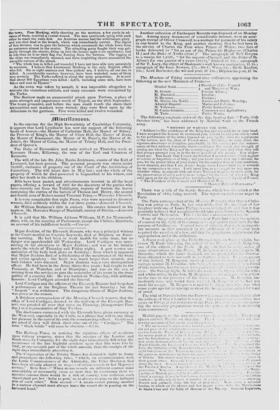Major Jenkins, of the Eleventh Hassars, who was a principal
witness at the Court-martial on Captain Reynolds, died at Brighton on Satur- day morning. He had beets in weak health for some time, but no danger was apprehendM till Wednesday. Lord Cardigan was unre- mitting in his attentions to 31.1jor Jenkins ; and was at his bedside '
nearly the whole of Thursday-and Friday nights. A post mortem ex- amination of the body took place on Saturday ; from which it appeared
that Major Jenkins died of a thickening of the membranes of the braie and serous apoplexy : the heart was munch larger than natural, and both kidnies were diseased. Major Jenkins was a very distinguished officer. He had been in the Army thirty-five years ; had fought in the Peninsula, at Waterloo, and at Illsurtpore ; and was on the eve of retiring from the service, to pass the remainder of his years in the tran- quillity of a country life. He was buried on Wednesday, with military honours : Lord Cardigan attended the funeral.
. Lord Cardigan and the officers of the Eleventh Hussars had bespoken a performance at the Brighton Theatre for last Saturday ; but the " bespeak " was withdrawn. The dangerous illness of Major Jenkins, was given as the reason.
A Brighton correspondent of the Morning ('loin die reports, that the effigy of Lord Cardigan, dressed in the nniform of' the Eleventh 1111S- SUN, was paraded all Over that tows on Thursday, (1 an pow der- Plot. day,) as a representative of Guy Era lees.
The disclosures connected with the Eleventh have given currency at the West-end, especially its the Ciubs, to a phrase that will be any thing but pleasant in the ears of the irritable commanding-officer. Gentlemen are asked it' they will drink their wine out of the " Cardigan." The terns " black bottle " Will soon he obsolete.--(lh,be.
The Railway Times, its noticing the injurious effects of aeeidents upon railway property, states that the receipts of the 1,011(lots and South-western Company, for the eight days immediately following the occurrence of the late friglitfal accident its t hat line were less by
■ 00/., or one-seventh part of the whole amount, than the receipts of the eight days immediately preeeding it.
The tarpons ioa of the Trinity I IOUSO haS deCIIICa ri unit to frame and promulgate the following rules, '6 whiell, on conninuneation with the Lords Commissioners of the Admiralty, the Elder Brethren find have been already adopted in resised of steam-vessels in her Maji,sty's service." Rule first—" When steam-vessels on different courses must Unavoidably or necessarily cross Si, near that by continuing their re- spective courses there would he a risk oh' coming into collision, each vessel shall put her helm to port,' so as always to pas.s on the larboard side of each other." Rule seeontl—" A steam-vessel passing another in it narrow channel must always leave the vessel she is passing on the larboard hand." Another collection of Exchequer Records was disposed of on Monday last. Among many documents of considerable interest, were an auto- graph receipt of Oliver Cromwell to a warrant for payment of his salary as cup-bearer to the King, and another showing that he had been in the service of Charles the First when Prince of Wales; two lists of books delivered in " for ye use of the Prince his Highnesse (Charles II.) and the Duke of Yorke (1641.)" The autograph of Nell Gwynn to a receipt for 1,230/., " for the support of herself, and the Duke of St. Albans for one quarter of a yeare (1683)," fetched 1/. 10s.; autograph of Sir T. Lucy, the object of Shakspere's well known castigation, 1/. Is.; autograph of Sir Isaac Newton, 17s. ; Sir C. Wren. 13s. ; Sir G. Kneller, 13.s. ; Lord Rochester, the wit and poet, 1/. 138.; Dryden the poet, 1/. 9s.


























 Previous page
Previous page